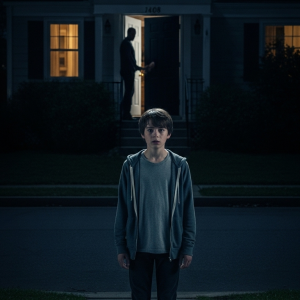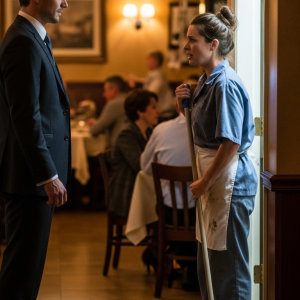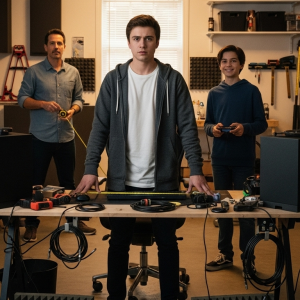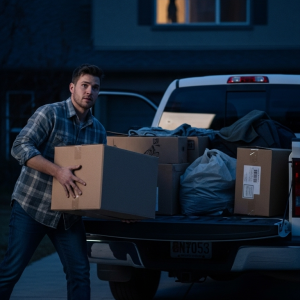A year of divorce is a strange anniversary. There are no cards, no celebrations; just the quiet acknowledgment of a life cleaved in two. At 37, I share my life and my two sons, aged ten and seven, with a woman I no longer recognize. My ex-wife, 36, and I exist in a state of cold civility, a ceasefire held together by the logistical needs of our children.
Our marriage didn’t end with a bang, but with the slow, grinding erosion of a thousand arguments. The final one was the breaking point. In the heat of it, she screamed words that could never be unsaid: “I regret every single day of this marriage!” In the ringing silence that followed, I knew I was done. I packed a bag, filed for divorce, and she never once reached out to stop me.
She moved on six months later. I heard about her new relationship through the grapevine, a casual mention that felt like a punch to the gut. But it was her life. I had no claim to it. Our communication shrank to a sterile exchange of texts about pickup times and school projects, a language of pure function, devoid of feeling.
I told myself she was still a good mother. Despite the bitterness between us, I saw her dedication. I believed her love for our children was the one unshakeable truth left between us. I was wrong. A recent incident didn’t just alter my perception; it shattered it completely, forcing me to question everything I thought I knew about the woman I once married.
Ten days ago, I was on a business trip. Before leaving, I had confirmed everything with my ex-wife. She was to bring the kids to my house on the second day of my trip, per our custody schedule, and I would be home three days later. “Yes, I’ll keep them until you’re back. No problem,” her text read. I saved the screenshot, a habit born from a broken trust.
I was in a sterile hotel room, hundreds of miles away, when my phone rang. It was my son. His voice was small, tight with a fear that instantly seized my heart.
“Dad? Where are you? Mom just left.”
I sat bolt upright. “What do you mean, buddy? She’s supposed to be staying with you until I get home.”
“She dropped us at your door,” he said, his teeth chattering audibly through the phone. “She said it was your turn. We’ve been ringing the bell for fifteen minutes. Dad, it’s really cold.”
A wave of ice water washed over me. They were locked out. In the freezing dark. I told them to go to the neighbor’s house, my mind racing. But the neighbors weren’t home. Our street was new, half-empty, a ghost town of dark windows and silent porches. There was nowhere for them to go.
My hands trembled as I dialed my ex-wife, expecting a frantic apology, the sound of her car already racing back to fix her mistake. Instead, her voice was casual, almost bored.
When I explained the situation, her response was a blade. “Well, that’s not my problem. It’s your time with them. You should have been there.”
“Are you insane?” I pleaded, my voice cracking. “This isn’t about me or you! Your children are standing outside in the snow! Go get them!”
“Look,” she sighed, a sound of pure annoyance. “It’s our eight-month anniversary. My boyfriend made plans. They are your responsibility tonight. Figure it out.”
The line went dead. She had hung up.
Thirty-five minutes. That’s how long my sons, my seven and ten-year-old boys, were left huddled on my doorstep in the biting cold. They had wrapped themselves in my youngest’s small blanket, a flimsy shield against the encroaching night. With no other choice, my stomach churning with a mixture of fury and terror, I called Child Protective Services.
CPS arrived in minutes. They found my boys shivering on the front steps. They took them not to a stranger’s office, but to my parents’ house an hour out of town—a warm, safe harbor I couldn’t provide. That night, after the police informed me that my ex-wife had been arrested for child endangerment, I felt a grim, terrible vindication. My children were safe. And their mother would finally have to answer for what she had done.
The moment I returned, I drove straight to my parents’ house. Holding my sons, I apologized profusely, promising them they would never be in that position again.
“That’s why I’m going to ask the judge if you can live with me full-time,” I explained. “So you’ll always be safe here.”
My oldest son’s reaction wasn’t just relief. It was a profound, unsettling happiness. His eyes lit up in a way that pricked at my conscience. I had always assumed they were fine with their mother. Her actions now were shocking, but her past behavior? I thought she was a competent parent.
“Why does that make you so happy, buddy?” I asked gently.
He hesitated, looking down at his shoes. “Mom said… we weren’t allowed to tell you. She called it ‘our secret’.”
The story that followed unspooled like a nightmare. For months, their time with their mother had been a period of stark deprivation. She had suddenly implemented a bizarrely strict diet. They were forced to eat what they called “sick food”—tasteless porridge and plain oats—for nearly every meal. A weekend treat was a piece of toast with a thin spread. Meat and vegetables were nonexistent.
Their lives were a series of “no’s.” No friends over. No sleepovers. No new toys, books, or clothes. Shopping trips were for her needs only, with them expected to trail behind in silence. Any request, even for a simple pack of chicken nuggets, was met with a sharp reprimand. They were ghosts in their mother’s new life, instructed to be silent and invisible, and above all, to never, ever tell me.
When I finally confronted her, the dam of her composure broke. She didn’t apologize; she screamed. She raged about me calling the cops, about the humiliation of her arrest.
I cut through her fury. “Why are our sons starving in your house? I give you more than enough money for them to live comfortably. Where is it going?”
“I’m between jobs right now!” she shot back, but the excuse felt hollow. I pay her significant alimony on top of child support. There was no reason for our children to be living on porridge.
The argument escalated until she finally snapped, revealing the ugly truth with a single, venomous sentence. “It’s none of your business what I do with my money!”
But it wasn’t her money. It was for our children. And in that moment, I knew. My lawyer and I filed for full custody and simultaneously sued her for child abuse and neglect.
Her response only came after she was served. Her calls were a torrent of manufactured tears and frantic pleas. It wasn’t concern for the children that drove her, but the cold terror of losing her income stream. She begged, she bargained, even suggesting it was all a misguided prank to get my attention.
Then, her argument shifted. “I can’t afford this!” she cried. “I’m unemployed! I need that child support to live!”
She wanted custody for the paycheck, not the children. I was about to hang up in disgust when I heard her lawyer yelling in the background. “Forget the money! Talk to him about the lawsuit!”
Her tone changed instantly. “You can’t sue me for this,” she pleaded. “It’s too petty. I’m already facing criminal charges and losing my kids. Don’t you think that’s enough? You’re just doing this to hurt me because I moved on and you haven’t!”
I laughed. The delusion was so profound it was almost impressive. Then I disconnected the call.
Thanks to the advice of friends and family, the last vestiges of my guilt evaporated. I started digging. Though my ex-wife and I didn’t follow each other on social media, a mutual friend gave me access.
Her profile was a curated lie, paid for with my children’s well-being. It was a highlight reel of a life I never knew she was living: cocktails at rooftop bars, weekend beach getaways, romantic vacations with her boyfriend. There was no sign of a struggling, unemployed single mother. There was only a socialite, funding her lavish lifestyle with the money meant for her sons’ food, clothes, and happiness.
The custody battle was over before it began. She terminated her parental rights, unable to afford a lawyer for three simultaneous cases. The children are now, and will forever be, solely mine.
Her boyfriend called me once, a pathetic attempt to elicit sympathy. He told me how she was freelancing to support herself, the kids, and him while he was in school.
I cut him off. “You mean she was supporting you with my child support. The money I sent for my children’s food.”
When I mentioned her Instagram full of expensive trips, there was only silence. He hung up.
The lawsuit is moving forward, and the outcome is all but certain. She lost the case, of course, and now owes me a substantial sum of money. Her life of leisure, funded by the neglect of her children, is over.
My sons are thriving. They are happy, healthy, and finally free to just be kids. They rarely speak of their mother anymore. Sometimes, late at night, I think about the woman in those pictures, smiling from a beach in a faraway place. It’s a chilling reminder that sometimes, the people you think you know best are the greatest strangers of all.
The silence after the call with CPS was heavier and more terrifying than any jet engine. I sat in the sterile hotel room, staring at the phone in my hand as if it were a venomous snake. Every passing second was a turn of the knife. My sons. Alone. Cold. The horror of it was a physical thing, a living creature clawing at the inside of my chest.
Leaving the business trip wasn’t a choice—it was a primal command. I called my boss in the middle of the night, my voice a fractured mess of rage and panic. “A family emergency,” I stammered. “I have to go home. Right now.” To his credit, he asked no questions, his voice filled only with concern.
The earliest flight was at 5 a.m. The next four hours were the longest of my life. I didn’t sleep. I paced the cheap hotel carpet, my mind playing a non-stop loop of worst-case scenarios. I must have called my parents a dozen times.
“How are they?” I asked on the third call.
“They’re sleeping, son,” my mother’s voice was soft, but I could hear the steel beneath it. “They were exhausted. The little one wouldn’t let go of your father. Jacob, they were so scared.”
On the plane, I sat by the window, staring down at the unfeeling blanket of clouds below. Every mile closer to home felt like an agony. Where had I failed? How had I been so blind to the monster my ex-wife had become? I had been so busy maintaining a cold peace, so focused on being the “reasonable” co-parent, that I’d missed the ground crumbling beneath my own children’s feet. The ugly truth was this: I had been paying for my children’s own abuse, funding her neglect with punctual checks and polite silence. The plane landed with a jolt, and I ran, not walked, through the terminal.
My parents’ house had always been a bastion of warmth and safety. The smell of my mother’s baking and the crackle of wood in the fireplace. But when I walked in, the silence was heavy. My sons were on the sofa, wrapped in thick blankets. They looked up as I entered, and their faces—pale and drawn—shattered my heart.
They launched themselves into my arms, and I held them, feeling the tremors in their small bodies. We said nothing for a few minutes. There were no words. I could only smell the cold that still seemed to be clinging to their hair.
That evening, after they’d eaten a hot meal and were distracted by cartoons, I sat with my father. He was a man of few words, but his eyes held a deep wisdom.
“I’ve seen something was off for months,” he said quietly, staring into the fire. “Every time they came over after being with her, they were a little thinner. Quieter. Your mother tried to ask, but they’d just shake their heads.”
The guilt was a fresh wave of nausea. “Why didn’t you tell me?”
“We thought it was just the divorce,” he admitted, his voice rough with regret. “We didn’t want to pour fuel on the fire between you two. We never, not for one second, imagined this.”
That night, my youngest son had a nightmare. He screamed in his sleep, raw cries about being left alone in the dark. I carried him into my bed, and he clutched my shirt, even in sleep. Lying there in the dark, listening to his breathing finally even out, my anger solidified into something colder and much sharper. It was no longer an emotion. It was a plan.
The emergency custody hearing took place in a small, windowless courtroom that smelled of old paper and contained desperation. I sat beside Rich, my lawyer, who exuded a sense of rock-solid calm.
My ex-wife sat across from us. She didn’t look like a monster. She looked… annoyed. She wore an expensive blouse I vaguely recognized paying for, her makeup carefully applied to hide the stress in her eyes. When our eyes met, I saw no remorse. I saw resentment. In her mind, I was the cause of this problem, not her actions.
Her lawyer began, attempting to paint a picture of a “regrettable misunderstanding.”
“My client has been under a great deal of stress,” he droned. “She made an error in judgment, one for which she is deeply sorry.”
Rich let the silence hang in the air after he finished before he rose to his feet. He didn’t raise his voice. He didn’t have to.
“Your Honor,” Rich began, his voice cutting through the room. “This was not an error in judgment. This was abandonment. My client has text message evidence confirming the respondent agreed to care for these children. She then chose to drive them to an empty house, leave them in freezing temperatures, and turn off her phone to celebrate an anniversary.”
He paused, letting the weight of his words sink in. “While my client was desperately trying to find his children shelter from hundreds of miles away, the respondent was raising a glass of champagne. Which part of that sequence of events, I ask the court, constitutes a ‘misunderstanding’?”
My ex-wife flinched. The judge, an older woman with eyes that missed nothing, stared at her over the rim of her glasses.
“Ma’am,” the judge said, her voice dangerously soft. “Did you or did you not leave your seven and ten-year-old children on a doorstep in the snow?”
“I… it was his time. I thought he would be there…” she stammered.
“That is not what I asked,” the judge countered. “You are their mother. Your primary responsibility is their safety. In that, you failed spectacularly.” She banged her gavel once. “Temporary sole custody is granted to the father, effective immediately. We will reconvene in thirty days to discuss a permanent arrangement. And I suggest you find a very good criminal defense attorney.”
Walking out of that courtroom, I didn’t feel triumphant. I just felt the first, fragile sense of relief. The bleeding had stopped.
In the weeks that followed, a single question gnawed at me: Why? The story of her being “between jobs” didn’t add up against the alimony and child support figures. I knew there was a missing piece.
I had distanced myself from our old mutual friends after the divorce. It was too painful. But I knew I had to bridge that gap. I called Mark, an old college friend we both shared.
The call was awkward. “Hey man, long time,” I started. “Listen, this is going to sound weird, but could we grab a beer? There’s something I need to ask you.”
We met at a quiet bar. For a while, we made small talk, catching up on years of lost time. Finally, I took a deep breath.
“Mark, this isn’t about gossip,” I said, looking him in the eye. “This is about my sons. I have them full-time now. There was… an incident. She left them. It turns out, for months, she’s barely been feeding them. She claims she’s broke.”
Mark’s friendly demeanor faded, replaced by a look of deep discomfort. He ran a hand over his face. “Man, I knew it. A few of us have been talking… we didn’t want to get in the middle of it, but…” He hesitated, then pulled out his phone. “Her life online… it doesn’t match the story she’s telling you. We’re still connected on social media.”
He turned the phone towards me. And there it was. The missing piece. It wasn’t just a few pictures. It was a meticulously documented chronicle of a life of leisure. A weekend trip to a wine country resort. Cocktails on a rooftop bar with her new boyfriend. A vacation to a beachside resort, the turquoise water a stark contrast to my own dark reality. Designer handbags. Expensive dinners.
The room spun. This was where the money was going. Not to my children’s food, or their clothes, or their well-being. It was funding this… this fantasy. A curated lie built on a foundation of porridge and neglect.
“She’s been supporting her boyfriend, too,” Mark added quietly. “He’s not working. She’s paying for his classes.”
I handed the phone back, my hands numb. The rage was back, but it was different now. It was cold, clear, and absolute. She hadn’t just neglected our children out of poverty or stress. She had actively deprived them to finance her new life. She had made a choice. And now, so would I.
Winning the legal battles was the easy part. The real work began at home. The trauma of that night, and the months of neglect leading up to it, had left deep, invisible scars on my sons.
My youngest developed a severe fear of being alone. He would follow me from room to room, his small hand always needing to be touching me. My oldest became quiet and withdrawn, hoarding snacks in his room as if he feared the food would disappear again.
I found a child therapist, a kind woman who helped me understand. “They need to rebuild their sense of security,” she explained. “They need consistency. They need to know that ‘no’ is about safety, not deprivation, and ‘yes’ is a celebration, not a rarity.”
So we started rebuilding. We created new routines, new traditions. “Taco Tuesdays” became a sacred event. Saturday morning pancakes, where more flour ended up on us than in the bowl, became our ritual. I took them grocery shopping and let them fill the cart with their favorite cereals, fruits, and even the junk food their mother had forbidden. Watching their faces light up at such a simple freedom was both heartbreaking and healing.
One afternoon, a few months later, I was working from home when I heard peals of laughter coming from the backyard. I looked out the window. My sons were having a water balloon fight, completely soaked and deliriously happy. It was such a normal, beautifully mundane sight, and tears welled in my eyes. It was the sound of a childhood being reclaimed.
The final court date for the neglect lawsuit came and went. She was found liable, and the judgment against her was substantial. She will be paying me back for years, a legal and financial consequence for her actions. But I know the real victory isn’t in the money.
It’s in the quiet moments. It’s in tucking my sons into beds they know they are safe in. It’s in the easy laughter that now fills our home. It’s in the simple, profound peace of knowing that they are loved, they are provided for, and they will never, ever be left out in the cold again.




